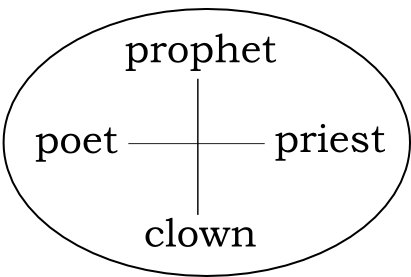poet or priest, prophet or clown
He had not learned to preach from poring over commentaries;
no, he learned from the fountain of revelations and the spirit--
from the wine that is so potent that when it is quaffed
the water of speech gushes from the mouth of the dumb,
and the new-born child becomes an eloquent divine
and, like the Messiah, recites words of ripened wisdom.
Rumi: Mathnawi VI:2654-2656
version by Camille and Kabir Helminski
via Sunlight
The above three couplets from Rumi's Mathnawi refer to the prophet Noah who "preached a new sermon" everyday. Me, I'll just post a new blog entry everyday and see how I go with that.
I've been rereading Joseph Campbell: The Masks of God: Occidental Mythology, especially the chapters on Islam. However, it is the Conclusion that I have found most rewarding to reread. In it, Campbell makes some nice distinctions, firstly among "attitudes toward divinities": those of the priests and those of the poets. The first tend to take their gods literally or "for real" while the second understand the reality of human imagination. While priests tend to maintain a religion or mythology, prophets will often initiate a new direction or found a new cult. The prophet, for Campbell, is a certain kind of poet:
Overwhelmed by his own muse, a bad poet may imagine his visions to be supernatural facts and so fall into the posture of a prophet - whose utterances I would define as "poetry overdone," over-interpreted; wherefore he becomes the founder of a cult and a generator of priests.
Thus does Campbell move into a third component of distinction, yielding: "the true poetry of the poet, the poetry overdone of the prophet, and the poetry done to death of the priest". However, he does also refer to the "poetry underdone" of the poet who is limited to the personal and fails to reach the archetypal. More specifically, this kind of poetry tends "to rest in the whimsies of personal surprise, joy, or anguish before the realities of life".
It's hard to find a nice fourth word to name this last kind of poet. The best I could find is "humorist" or "comic". From there, one readily thinks of the joker, the jester, the clown. This is a hugely popular figure in our current culture, perhaps because we are weary of the archetypal. The Homer Simpson character created by Matt Groening is the great debunker of all things serious, sacred, or sanctified. He is utterly anti-numinous.
There is a great deal of humour within Rumi's own writings. This debunking wit flashes out here and there throughout his opus. Perhaps it is finally what makes Rumi's work so complete and so satisfying.
So now we have four manifestations in the field of mythology:
1) the true poetry of the poet, of which Campbell himself is a prime example since he writes in a serious vein but with often highly lyrical passages;
2) the poetry overdone of the prophet, of which the Qur'an is a prime example since it takes God so seriously from go to whoa;
3) the poetry done to death of the priest, of which so many prayers - such as Christianity's "The Lord's Prayer" - are typical; and finally
4) the poetry underdone of the comic, of which Matt Groening is an outstanding exemplar.
Come to think of it, I like the word "clown" best for the last manifestation in mythology. It finishes well when one lists the types: poet or priest, prophet or clown.
I often think of Mohammad simply as Mo, a clown figure ("real" name Roy Rene) once popular here in Australia. According to Campbell's schema, clown Mo is indeed the shadow side of prophet Mohammad.




0 Comments:
Post a Comment
<< Home